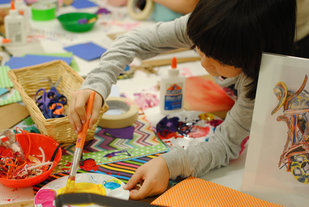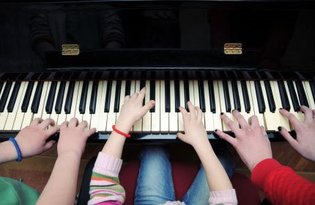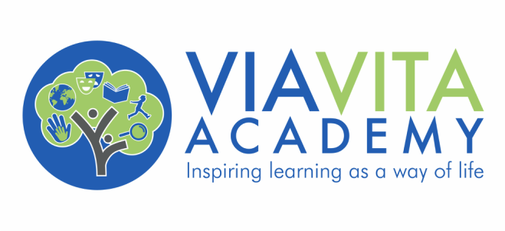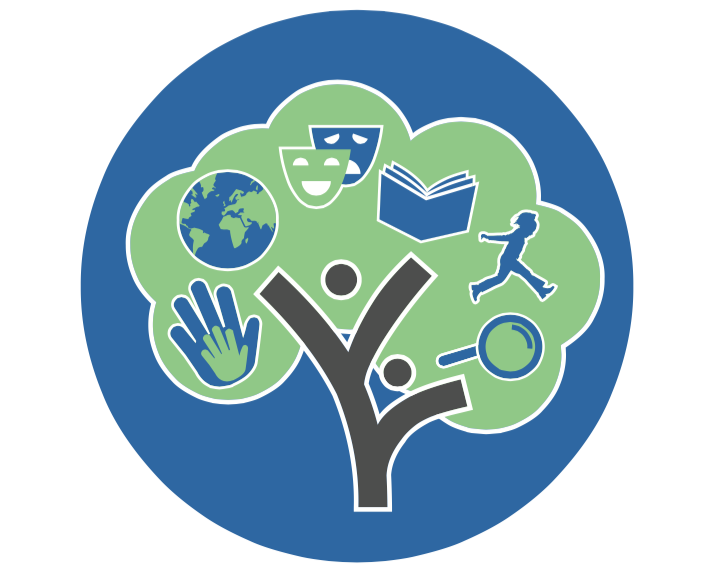|
Arts-Infused Education sounds fancy, but it's actually quite simple. It's messy, of course, but simple. It often requires a change of clothes, a large space, some loud noise, bright lights (darkness, too), movement, talking, and plenty of expression, but honestly and truly, it's not tricky nor is it difficult to implement. It's probably the most natural way of learning for any child (or adult, for that matter) and the most universal way of representing and expressing information. It connects to our most natural sense and ability that we all have. Most definitely, above all, it reaches to children as they are constantly seeking to learn about the world around them and find out how they fit into it. It connects to the sense of curiosity, a child's ability to express, and their need to explore. What's important to remember is that it's much more than painting and singing. (Although it includes that, too) It's filmmaking, exploring sound, music and theory, creative movement, dramatic forms and theory, sketches and structures, singing and speaking, handcrafting and building - it's endless! Arts-infused education involves getting your hands dirty. Taking risks. Discovering inner emotion. Discovering emotions of others. Gaining perspective. Representing knowledge. Expressing ideas. Problem solving. Moving. Stillness. Listening. Talking. Asking. Yelling. Creating. Education infused with the arts allows students to experience learning in a way that connects to who they are, creating the ultimate hands-on learning environment that works to the benefit of each child. Anything infused with arts, really, has the opportunity to inspire. When education and arts come together, it pulls at a students' inner ability and want to create, share, and explore. No matter their ability, their interests, their uniqueness - anything, especially education, that has the availability and opportunity for creativity to take form WILL reach, and motivate each child. The arts are vast, without limits. There is an endless amount of possibilities for learning, creating, expressing, and exploring ideas and emotions. Infuse the arts into reading, writing, math, science and socials and you've got the winning ticket! There's no limit to the ways to represent knowledge, the ways to express understanding, or the ways to engage each student. Arts-Infused Education offers a way to enhance learning that anything else would be hard pressed to compare. Students gain skills far beyond the textbook, and far beyond the classroom, that will help shape who they grow to be - their character, their personality, their work ethic. Wouldn't you want that for your child? Above all else, here's why we think it's important, and why it's implemented in every grade, for every child. 4 Lifelong Benefits of Arts-Infused Education  Creativity: The process of establishing novel ways to think, learn, and do that are representative of one's ideas, thoughts, and emotions. Students learn who they are, who they want to be, how they learn, how they express themselves, and how they achieve success. Students develop their individuality. They develop skills. They invest in knowledge and want to share their successes. Students create deeper understanding of how things work, as well as, why, where, and when they work. They learn from mistakes, take risks to learn more, and construct new and innovative ideas based on experience, understanding, and knowledge.  Collaboration: The process of working together with others toward a common goal or experience. Students learn patience, empathy, negotiation, and compromise. They learn how to build respect, earn respect, and give respect. They learn the power of diversity and celebration of diverse perspectives. Students gain knowledge from listening, talking, asking questions, and sharing. They try new things, create meaningful experiences, and build concrete understanding of complex issues. They feel emotion, express emotion, and learn to deal with emotion. Students build lasting, hands-on learning experiences that are connected with a sense of togetherness, inclusion, and peer support.  Critical Thinking: The process of using original and complex ideas to ask questions, solve problems, gain understanding, gain perspective, and seek depth. Students develop strategies, ideas, and new concepts. They learn what matters - to them, to others, to the world around them. Students create connections between the world, themselves, and experiences shared between them. They get to the root of the issue. They build strong character traits, work ethic, pride in achievement, and genuine respect for learning. Students apply concepts, manipulate and rediscover ideas and operations, and value the input of others. They seek out information, experiences, and opportunities to learn more about the world they live in.  Communication: The process of effectively expressing, sharing, receiving, and understanding ideas, emotions, thoughts, and concepts. Students are heard. They learn to express their ideas and have others respond. They learn how to connect with others, with learning, with the world. Students discover their self-confidence, find their inner voice, their bravery and strength. They test the boundaries, work wonders with words, find innovative ways to express knowledge, and challenge themselves to new levels of success. Students find value in advice, support, experiences, and constructive criticism. They experiment, explore, play, and reinvent. They learn about themselves, others, and the world around them. Students learn to redefine, manipulate, and explore ways to convey meaning, messages, emotion, and character, and ultimately, prepare themselves well for the future ahead. To learn how we integrate arts with education click here or comment below!
0 Comments
In the midst of the winter slump, this one is for you fellow teachers. This one is for you. To the teacher who starts every day with a fresh face and a smile for each student, and parent, no matter what happened the day before; To the teacher is on, all the time, ready to take on whatever or whoever comes their way; To the teacher who finds a way, every day, to find that joy. You know the one. The reward of helping s child to understand; To the teacher who communicates - who emails, who writes notes, who greets parents at the door, you keeps everyone in the know; To the teacher who keeps a pen and paper on their night stand to jot down ideas, whenever they come, usually in the middle of the night; To the teacher who smiles and praises a child's piece of writing, no matter the spelling mistakes and run on sentences, because they know that writing is just as much a piece of art as it is an essential form of communication; To the teacher who reads aloud to their students, proudly mimicking voices of characters and suspenseful moments, bringing a connection of joy to reading for each and every listener; To the teacher who always first looks for ways a child is right rather than correcting the ways in which they were wrong; To the teacher who wants a child to show their work, even when their answer is wrong, just so it proves that the child truly did try and their efforts always have worth; To the teacher who packs an extra apple (or more) in their lunch bag, just in case someone in their class comes without; To the teacher who knows each student, truly knows each of them - where they come from, who they are, and who they want to be; To the teacher who seeks the shining light in every child, creating opportunities that highlight the uniqueness and strength of each child; To the teacher who has truly never thought a child to be bad; To the teacher who talks to their students as individuals, respecting their emotions, their perspective, and supporting their originality; To the teacher who replays moments of the day over and over in their head, whether you want to or not; To the teacher who spends snow days and holidays prepping, catching up, planning, Pinteresting, reading, and most of all, thinking of ways to engage that one child; To the teacher who plans their wardrobe not according to their mood or the weather, but to the day's activities ahead, which could be anything from painting, to soccer, to knee deep in a pond; To the teacher who learns just as much from their students as their students learn from them; To the teacher who actually understands what it means to reflect, and actually does so; To the teacher who taught themselves phonics and base ten because it quickly became apparent it was necessary to know; To the teacher who shares their resources, ideas, and experiences with colleagues, because honestly, why wouldn't you; To the teacher who seeks out cool new apps, programs, and technologies and then actually uses them with their students, more than once or twice; To the teacher who stays up late correcting quizzes, baking for the bake sale, designing projects, researching information, writing emails to parents, or putting the finishing touches on presenting student work; To the teacher who reads young adult novels for pleasure, not because you have to read it to your students, but simply because you always get sucked into their suspenseful and adventurous plots; To the teacher who spends an obscene amount of time organizing, colour coding, labelling, stacking, sorting, cleaning, folding, repurposing and replenishing; To the teacher who connects the foam mats by a pattern, every time, just because; To the teacher who ensures that each child has seen you smile, every day; To the teacher who frequently spends their own money on school supplies, apps, games, books, programs, and resources without so much as a second thought; To the teacher who turns a teachable moment into a teachable hour, week, month or term.; To the teacher whose last minute, unplanned activities often end up being the most influential, creative, and engaging activities you've ever taught. To the teacher who calls their students their 'kids' because when you care about your job that much, you really care about them like they're your own children; To the teacher whose most memorable students, the ones who have truly taught you more about life, offered you the most rewarding experiences, and have confirmed your reasons for wanting to be a teacher, are often the ones others have let slip through the cracks or let go astray; To the teacher who still thinks about those past students and wonders how they're doing today; To you, teacher. This note is for you. We just wanted you to know that we appreciate you. We know you go above and beyond, and that's just who you are, and your students are benefiting because of it. Never stop being who are and doing what you love. You are creating miracles every day. You are influencing a growing generation to be independent, creative, strong, and supportive individuals. You matter and your teaching matters. You are truly meant to be a teacher and we thank you. You are doing a great job. Keep up the good work. Written by two teachers who love what they do.
Founders, Via Via Academy No news is never good news, in our experience. As educators, school administrators, program directors - whatever it may be - if we are working with your child, we don't want you to have to worry or wonder. We want you to feel calm, in the know, and supported. This means consistent communication - with you, with your child, with our teachers, and with each other. The more you know means the more you understand and the more you feel connected to your child's education and care. And really, isn't that what we're all striving for? To know what your child is doing in math class and how you can help them along? To know why your child sat next to the teacher today? To know why your child is all a sudden referencing random ancient egyptian facts? Or, perhaps, to know what the bake sale money is going to fund or why you need to send in a cheque for programs or fees?
Unfortunately, the larger the school, the more work it takes to ensure communication such as this remains consistent. In a small school, communication truly just feels natural. It just happens, without a second thought, because it feels right and because it's essential to the daily function of the school. Parents and teachers working closely together get to know each other well, and realize that a certain level of clear, consistent communication is needed to keep things running smoothly. When a school values communication, everyone gets involved; everyone is recognized, valued, and supported. It's just another reason why small schools make a big difference. 20 Things That Happen in a School That Values Communication
|
Welcome to Our BlogEach post is written by a supportive member of Via Vita Academy, be it a teacher, parent, student, community member, who is invested in the topic of education. Take a read and comment below! Archives
February 2022
Categories
All
|






 RSS Feed
RSS Feed